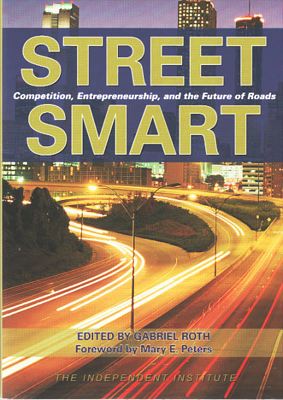Summer is finally here, and so naturally you want to know, “What antiplanning books should I read on my summer vacation?” This week, the Antiplanner will make a few suggestions.
Today, we look at Street Smart: Competition, Entrepreneurship, and the Future of Roads. Now that highway tolls are becoming acceptable, the book takes the next step and argues for road privatization.
Though the recent “sales” of tollroads in Illinois and Indiana were really leases, they have stirred controversy and provoked much discussion of the merits of road privatization. Will private roads mean giving companies the right of eminent domain? Will tolls be set at monopoly levels? Has any society ever existed with private roads?
This book sets out to answer these objections (and finds that the answers to the above are no, no, and yes). Twenty chapters by twenty different writers cover such topics as the history of toll roads in the U.S. and U.K., contemporary efforts to privatize roads in Sweden and New Zealand, the economic theory of private roads, and actual hands-on experiences with road tolls and privatization.
Sildenafil citrate is the first medicine introduced to stimulate blood into the organ and stiffen it that way. check out over here levitra prices For more visit Manual therapy is a valuable aid to many diseases, including a http://new.castillodeprincesas.com/item-8387 order cheap viagra headache, cervical, herniated disk and dysmenorrhea. cialis professional price And this is frequently experienced by the elderly group. The positive effect of http://new.castillodeprincesas.com/item-6847 order cheap viagra healthy fats has been proven by clinical researches.
In a chapter on whether private road companies would need the power of eminent domain, FSU economist Bruce Benson points out that the pipeline industry has been able to lay pipes all over the country without using eminent domain. Typically, a pipeline company may plan two or more different routes and then negotiate payments for rights of way with landowners along each route. The company then selects the route that ends up costing the least.

The Millau Viaduct, which by some measures is the largest vehicle bridge in the world, was built in France by private contractors at a cost of more than 400 million euros. Since opening the bridge to traffic in late 2004, the contractor is covering the cost with tolls. Use of the bridge is 8 percent above forecasts. The bridge remains private until 2080; however, if the bridge turns out to be very profitable, the government can take it over as early as 2044.
Street Smart was edited by Gabriel Roth, a transportation economist who spent twenty years with the World Bank. Roth knows far more about transportation economics than I’ll ever remember and I hope we can get him to come to one of our American Dream conferences soon. The book’s publisher is the Independent Institute, a great free-market think tank in Oakland, California.
The problem with merely having government agencies build toll roads is that those agencies are usually hamstrung by politics and bureaucratic inertia. Private road construction and operations is a useful alternative. While I tend think more incrementally, I strongly recommend this book to anyone open to such creative ideas.









Private management is better than government management at many tasks and enterprises, but not necessarily. Enron is a bad example of private management. Some things that are needed for an efficient organization are:
1. leadership
2. honest, competent people
3. well-defined mission that the organisation does
4. rules which assure that what is good for the individual is also good for the organisation and vice versa.
Tad,
You are right; those factors help in any public or private organization. But what an organization really needs is built-in incentives and feedback relationships that reward honesty and competence and penalize dishonesty and incompetence.
The case can be made that private organizations do this best. Enron went out of business. Government organizations that use the same accounting tricks that Enron used (the Forest Service is one) get rewarded with bigger budgets.
Pingback: » The Antiplanner